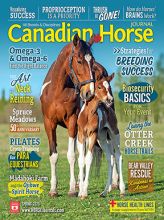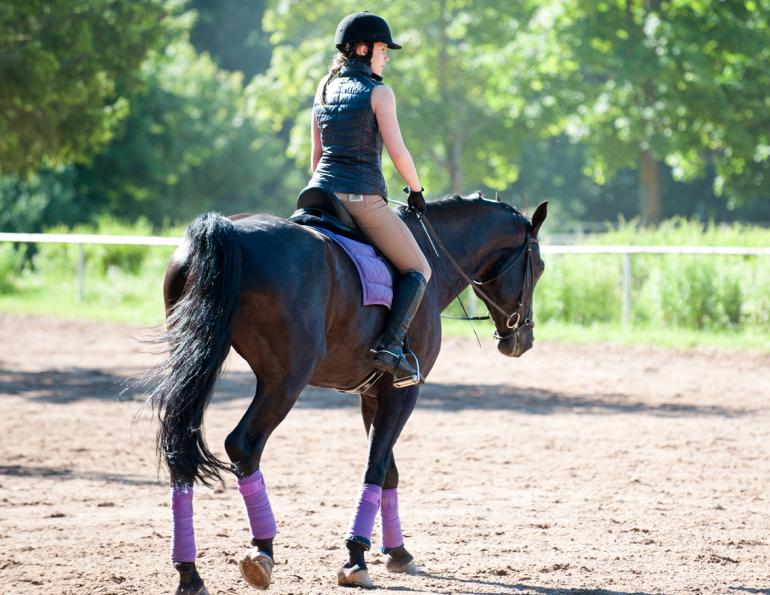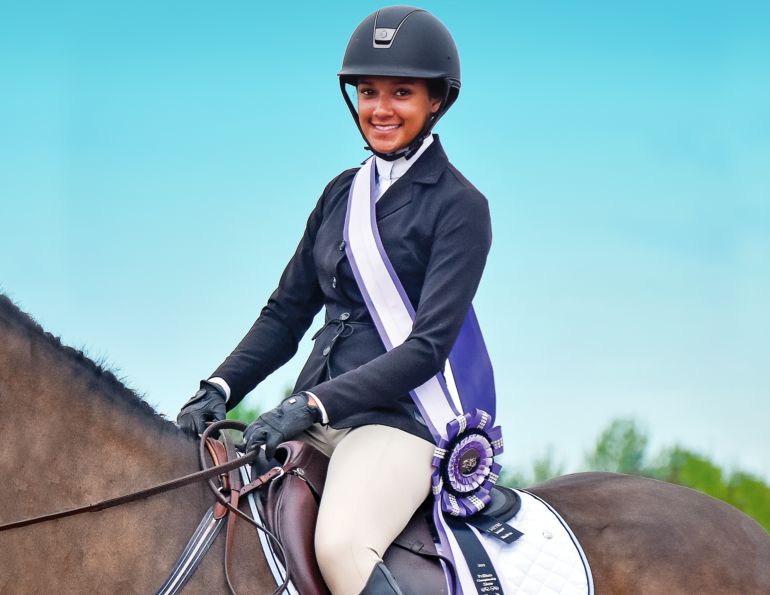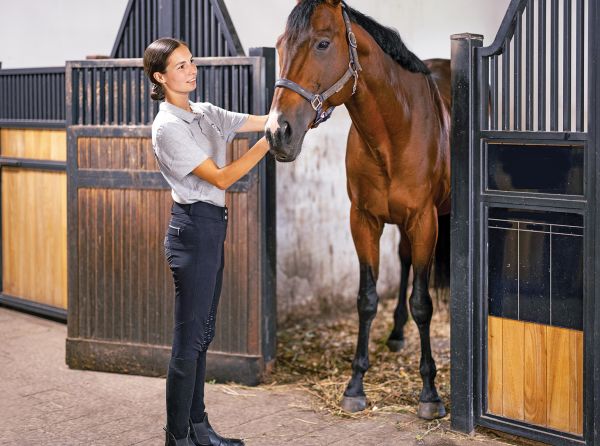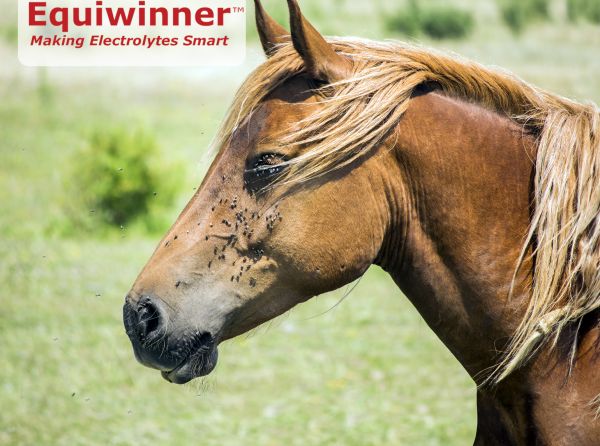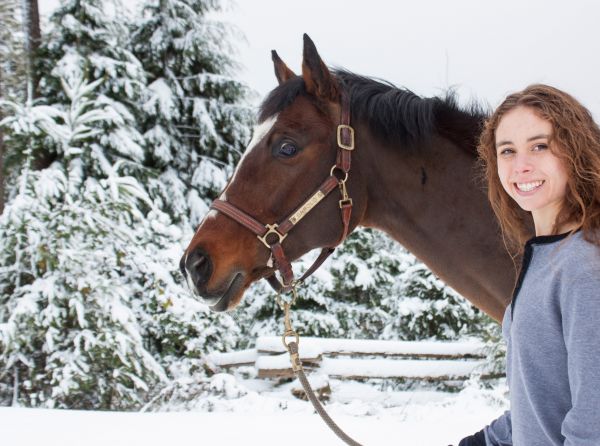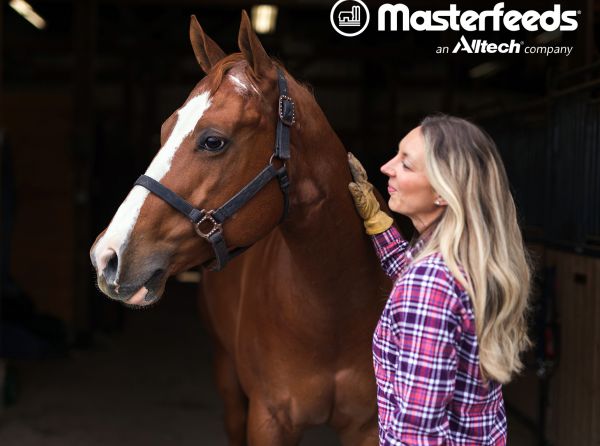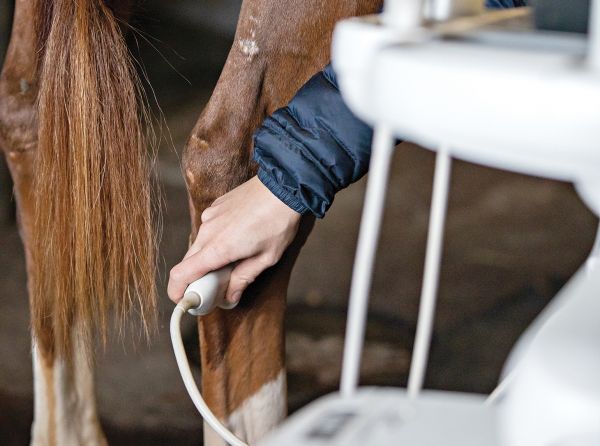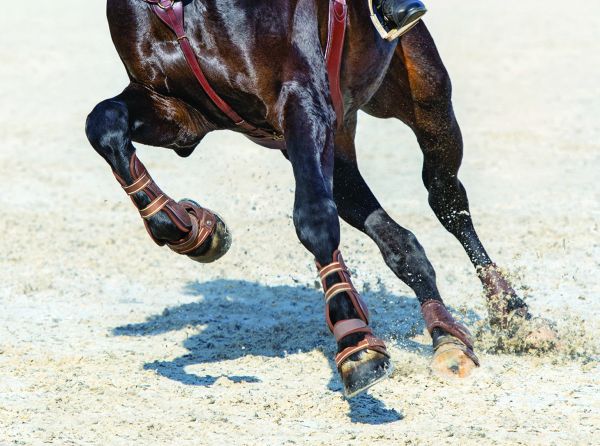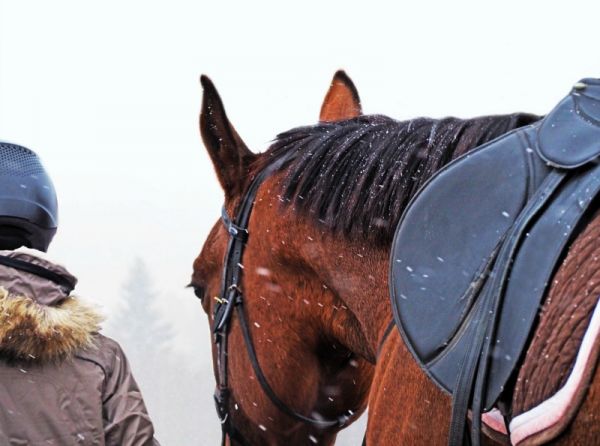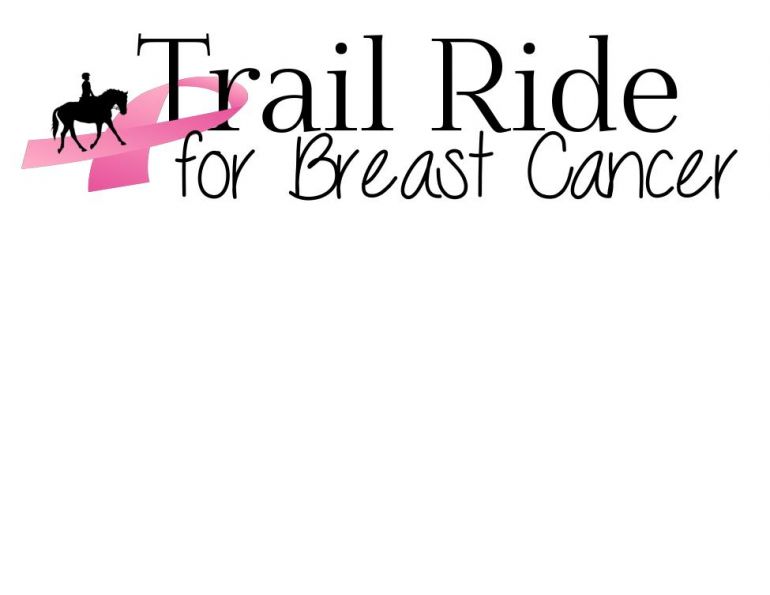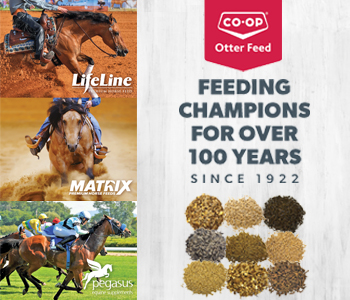The details in this article are relevant to the time it was published, in 2012, and some information will be outdated.
Interviewed by Karen Robinson
Tucked away in a valley at the junction of two small rivers, half way between Vancouver and the major tourist destinations of the Okanagan and Kootenays, is the little town of Princeton, British Columbia. It is better known for the mountainous, windy highway known as the Hope-Princeton that reaches it from the west than for any features of its own. But for Lisa Coulter, Princeton is a place she will always be proud to call home. The fact that she has broken into the upper echelon of international reining is something Coulter hopes will be an inspiration to young riders from across the country, no matter what their discipline. “I know it’s such a cliché, but I don’t know how else to express it,” she says. “Just follow your dream.” Winning team and individual silver medals at this summer’s CRI4* WEG (World Equestrian Games) reining test event in Lexington, Kentucky, 38-year-old Coulter is following her dream right to the biggest show of her life: the 2010 WEG.
Speed and Finesse
Even though she grew up in town and no one in her family rode, Coulter discovered early in life that she was a horse-crazy girl. “My mom is actually petrified of horses, but I had a love when I was a little girl and I followed through with it.” Coulter tried every discipline available to her, from barrel racing, to dressage, to galloping race horses at the track.
Her riding career might have taken a different path if it weren’t for her mother’s fear of watching her jump. “I would jump my barrel horse and as they kept raising the jumps my mom would leave the arena. She just couldn’t stand to watch.” Talked out of jumping, Coulter looked for adrenaline elsewhere. Barrel racing had the speed she craved, but not the finesse of dressage, a discipline she has always found fascinating. Reining combined the thrill of galloping with the finer points of training.
“There is so much body control and language between the horse and rider that I thrive on,” she says. “The speed is great, but making the horse dance appeals to me.”
Although Coulter began her reining education as a teen, a car accident and several other of life’s inevitable left hooks kept her from competing until she was in her late twenties. It was only in the early years of this decade that Coulter began to get serious about her competitive goals. Where other top riders begin in the show ring and later retire to training at home, Coulter has walked that path in the opposite direction. The pay-off is that what she learned breaking young horses and preparing prospects for sale has brought her rapid success in competition. “I’ve prepared some good horses and it’s great to get out in the pen now and show off what I can do.” And show off she does, from the style of her riding to the cut of her sparkly shirts.
Dress Like a Lady
For female Western riders who like to go fast, barrel racing is usually the discipline of choice. Reining – a least at the top levels – is largely a male domain. When Coulter first began to compete, she made a conscious decision to dress similarly to her male rivals – which usually meant a plaid cowboy shirt. “I was trying to beat the boys, so I thought that was a better way to go, not to stand out,” she says. It was her mentor and sponsor Bob (Robert) Thompson who finally said to her that it was time she changed her wardrobe and started “to look like a woman.”
Enter clothing designer Diane Olsen. As Coulter began to shop for a more feminine look, she found that the show shirts more often seen in Western performance divisions such as Trail and Pleasure were expensive. She also discovered that when she checked the label of a shirt she liked, it always displayed the name Diane Olsen. “Diane’s shirts are well known in the other Western disciplines, but had never really taken off in reining,” says Coulter. “Her quality and craftsmanship set her apart.”
She discovered Olsen’s Ultimate Show Apparel shirts while competing in Phoenix, Arizona, but Coulter was pleased to find out that Olsen is from another not-so-big town in central BC: Armstrong. She still competes in the custom shirts that she ordered during her first visit to Olsen.

Coulter was a part of the silver medal winning Canadian team at the WEG Reining test event in July 2009. Photo: Equisport Photos
When Coulter qualified for the biggest annual reining event in the world in 2005, the World Reining Masters, she asked Olsen to design a shirt that would clearly define Coulter as a Canadian. “I’ve worn that shirt three times and now it’s my lucky shirt,” she says, before claiming that she is not a generally superstitious person — unlike one of her main rivals from south of the border, Shawn Flarida.
Flarida has a green shirt which, according to Coulter, he calls his “lucky, lucky, lucky shirt. He just can’t stand it when he can’t wear that shirt.”
Flarida is so devoted to his lucky shirt, in fact, that his website is called www.thegreenshirt.com.
During the team event in Kentucky, Coulter thought it appropriate to dress identically to her male teammates in a white shirt with a small Canadian flag on one breast pocket; but for the individual event, she asked permission from the team to wear her glittering Canadian flag shirt. The individual silver medal looked especially beautiful around Coulter’s neck with the Maple Leaf as a back drop. Flarida was denied his request to wear his triple lucky shirt in the individual competition, but Coulter says that in the non-team competition later that week, “he showed up in his green shirt and kicked everybody’s butt.”
Competing against mostly men is something Coulter doesn’t think about very often, though the men do like to tease her about her fancy outfits. “‘You look so much better than us,’ they say to me. When I put on these shirts I always feel ready to attack.
It’s like the rest of life; if you look good you usually feel good.” She says that the camaraderie in the reining community is very strong, partly due to the fact that those against whom she goes head-to-head in the pen are often the same people with whom she does business with in buying and selling horses. Despite the ribbing for her colour-coordinated clothes, Coulter feels a kinship with her fellow reiners, whether they ride for the Canadian flag or another.
What’s in a Name?
The horse that carried Coulter to her Kentucky successes was not the mount she had originally intended to take, but when that horse was injured, Hollywood Ace more than stepped up to the plate.
Now that it has been welcomed into the FEI’s stable of disciplines, reining has an age restriction which has caused a shift in the average age of the horses in competition. To compete in any FEI sanctioned event, the minimum horse age is six years. “It’s a whole new thing for us,” says Coulter. “Usually we are competing on three- and four-year-olds.” The FEI’s minimum age requirement has provided an opportunity for horses that might not otherwise have had a chance to shine. A case in point is Coulter’s most recent acquisition: a six-year-old seal brown gelding named Western Whiz. After being crippled by a fracture at age three, the young horse was subsequently out of action for more than a year. Coulter, who had known about the talented horse as a youngster, was reintroduced to him by Flarida this July. “I loved him,” she says, simply describing her motivation to buy. Because of his age, he is an excellent prospect for the FEI events, including WEG 2010; and that is how Coulter came to give him his stable name: Weg.
Always a Proud Canadian
When Coulter decided to pursue reining as a career, she wrote down a top ten list of trainers. Many of those trainers were based in Texas and Coulter had been encouraged to go south to pursue her goals — so Texas was where she headed. “By the time I visited the third name on my list I had a job.” Pilot Point, Texas, just north of Dallas, became her home for a number of years and she still co-owns a ranch there with Bob Thompson. The return to small-town life in Princeton was motivated by two factors: her eight-year-old daughter Clancy and her commitment to Canadian reining.
Clancy is able to travel with her mother to competitions thanks to her elementary school in Princeton. Photo: Marv Carlson
Raising Clancy as a single mother, Coulter took her small daughter with her on her travels. Now that Clancy is in school, however, Coulter decided it was time to have a more permanent lifestyle for her daughter. “My mom Zandra is in Kelowna, my sister Korri is in Vernon, and my dad Marv is here in Princeton, so there is lots of support. I want Clancy to have some Canadian roots. I felt strongly that I wanted her to be a Canadian and raised with her family.” The schools in Texas refused to accommodate the occasional trip where Clancy would accompany her mom on a prolonged competition circuit, but the elementary school in Princeton is another story. “Her teachers have just been so supportive. They think it’s neat that she travels and sees a lot of the world.” When Clancy accompanies her mother on the road, the school prepares a home schooling supplement for Coulter to use, so that Clancy can easily reintegrate to the classroom after her absence.
Coulter, who would sometimes have to find a ride to the barn whichever way she could as a child, says her own daughter has horses more conveniently located right at home. “I was given an old horse to encourage her to take an interest in riding,” says Coulter, “but I have backed off and let her pick her own way. I don’t want to become a ‘horse show mom.’”
Coulter’s first formal volunteer role was as a Director-at-Large for Reining Canada in 2003. “I felt strongly that sometimes there aren’t enough ‘worker bees.’ Everyone can boss me around — I’m comfortable with that and am happy to just do the work.”
In 2008 she was asked to join the Reining High Performance Committee, and she accepted. She is also now on the Equine Canada Competitions Committee as well. “My big motivation right now is to develop the sport in Canada,” she says. “I’m one of those trainers who grew up here but went south because of opportunities. I’d like to see that change and keep Canadian trainers at home. That will only happen when there is a reason for them to stay home. I’m also working hard with youth riders, and want to put a team together for the North American Junior and Young Rider Championships.” Coulter knows that not everyone in the sport agrees with her, but as she points out, “you can’t just show up from training outside of Canada and not promote the growth of the sport from within.” She still keeps a foot in Texas with the ranch, but she makes a point of bringing her horses home and being active on national committees.
Some new stamps appeared in Coulter’s passport in the fall of 2009 as she sought out the qualifying points she needed in order to be one of two Canadians to compete at the World Reining Masters. A win at a CRI* in Monterrey, Mexico, ensured that she and Ace would make the trip to Oklahoma City, Oklahoma on December 3, 2009.
She and Ace, along with fellow Canadian Patrice St. Onge, battled top riders from 18 countries during the World Reining Masters. Both Coulter and St. Onge tied for fourth place in the difficult Open division with 217.5.
While Ace and Weg are her top hopes for the biggest championships, Coulter has back-up in the form of two or three more horses that could potentially rise to the occasion. Planning is of utmost importance when looking as far down the road as the WEG, which takes place only once every four years. “We have to think so far in advance. The horses only have so many runs in them.”
Back at home in Princeton, Coulter has indulged two of her other passions — buying and selling real estate and interior decorating. “I love real estate. I just bought a heritage house in Princeton and renovated it.” Her domestic side is tempered by a strong athletic and competitive urge. “I play hockey and I took up golf this year. When I was growing up I played Ringette and figure skated. They didn’t really have hockey for girls back then, otherwise I would probably be on the Canadian Women’s Hockey Team!”
A Tip of the Cowboy Hat to Bob Thompson
Calgarian Bob Thompson is, to many, the father of reining in Canada. He started Reining Canada and continues his support of the sport both in Canada and internationally through his involvement with the FEI. “Bob has been a driving force in my career, too,” says Coulter. “He believed in me from the beginning, when I was just loping colts around.” Thompson owns every horse that Coulter competes nowadays. “He has really been my backbone, and he gives so much to the sport.” Whether it’s giving wardrobe advice to Coulter, or donating funds to send teams to compete internationally, Bob Thompson is, for Coulter and most people in Canadian reining, “the reason it’s all happening.”
The details in this article are relevant to the time it was published, in 2012, and some information will be outdated.
Main photo: Waltenberry - Lisa Coulter of Princeton, BC slid into second place at the Kentucky Cup Reining CRI4* test event for the 2010 WEG. She now has her sights set on competing at the WEG.


